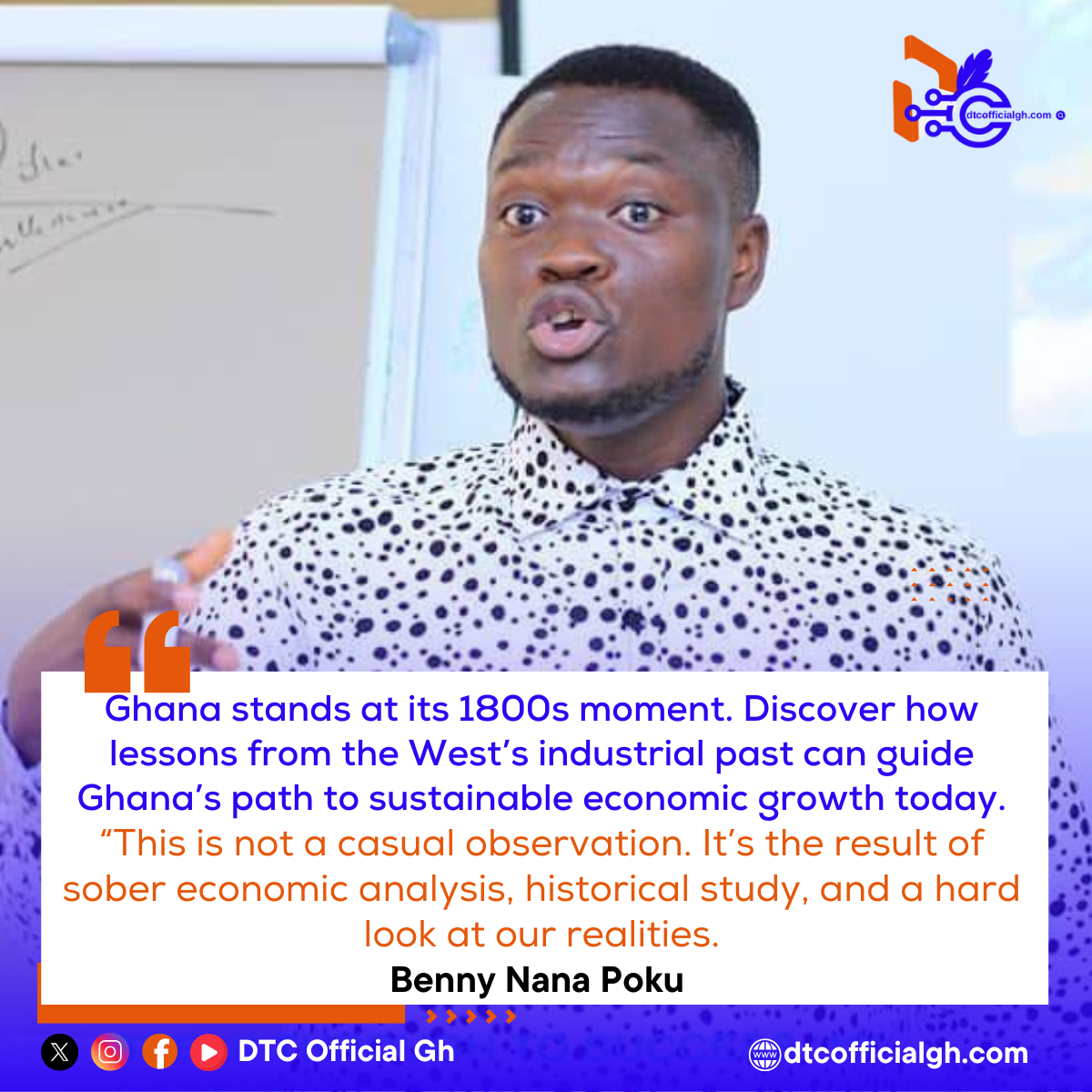Ghana has no excuse. We have centuries of lessons, technology, access to global capital, and a young, energetic workforce.

By Benny Nana Poku | Investment Analyst & Founder, Flowwealt
Ghana today finds itself in a position strikingly similar to where parts of today’s developed economies stood in the 1800s.
In August 2025, as I write this, I see our developmental stage mirroring that period in the West, an era when nations like the United States and Britain were laying the groundwork for the industrial revolutions that would transform their destinies.

This is not a casual observation. It’s the result of sober economic analysis, historical study, and a hard look at our realities.
READ ALSO: How One Man is Rewriting the Future of Education and Entrepreneurship in Africa
Infrastructure: The First Foundations
Our infrastructure remains fragile. The electricity grid is prone to frequent outages. Railroads are virtually nonexistent. Roads are inconsistent and deteriorating, making the transport of goods slow and costly. Water supply is unreliable in many areas, drainage systems are inadequate, and broadband internet, while improving, still lags behind global standards.
For more insights and inspiring stories, kindly follow us on Twitter and WhatsApp for more.
These gaps raise the cost of doing business and limit our ability to compete globally. The West in the 1800s faced similar constraints. Their railroads often broke down, canals flooded, and telegraph lines failed. But they kept building, with a clear national vision. Every mile of track and every factory erected was an investment in a future economy they could barely imagine. That relentless commitment is what propelled them into the industrial age.
Capital Markets: Still in Infancy
Our capital markets are shallow. We have only a handful of institutional investors, minimal trading on our stock exchange, and limited debt and equity options. Businesses still rely heavily on short-term bank loans and foreign aid, making large-scale, long-term projects difficult to fund.
In the 1800s, the West was the same. The New York Stock Exchange began in 1792 with just 24 brokers meeting under a tree. Capital was concentrated in the hands of a small elite. The difference is that they rapidly expanded their systems, creating banks, credit institutions, and investment markets that financed factories, railways, and whole industries.
Without a similar vision, our entrepreneurs will remain underfunded, and our economy will grow slower than its true potential.
READ ALSO: Wealth Is Not a Mystery: 5 Practical Steps to Build Real Financial Resilience
Industry: Stuck in Raw Exports
Ghana’s economy still relies heavily on raw material exports, cocoa, gold, and oil, much like the agrarian economies of the West two centuries ago. The difference is what they did next: they reinvested their resource wealth into factories, transport, and new technologies. They processed goods at home, creating jobs and keeping wealth within their borders.
We, on the other hand, export cocoa beans but import chocolate; we export crude oil but import refined fuel. Until we process more of our raw materials locally, we will keep exporting opportunities alongside our resources.
Entrepreneurship: Potential Without Support
Over 70% of Ghana’s economy is made up of small businesses, most informal. We have a rising generation of ambitious entrepreneurs, but they lack patient, long-term capital. In the 1800s, Western economies began expanding lending, credit, and investment networks, helping small enterprises grow into companies that still dominate global markets today.
Without accessible financing, supportive policies, and strong business infrastructure, our entrepreneurs will remain stuck at the micro scale.
Education: Quantity Without Relevance
While the West in the 1800s reserved formal education for the elite, they tailored it to the needs of an industrializing economy, producing engineers, machinists, and scientists.
Ghana has mass education today, but much of it is disconnected from economic needs. We produce more job seekers than job creators. Graduates often lack practical, technical, or digital skills required in the industries we want to build. Until we align education with economic priorities, we will keep exporting talent and underutilizing our workforce.
Wealth Systems: Missing the Long Game
In the 1800s, families like the Rockefellers, Rothschilds, and Aboitiz began building systems, businesses, trusts, and investments that created lasting dynasties. Ghana has very few such structures. Weak inheritance laws, a cash-based economy, and poor wealth management mean that most fortunes are lost within a generation.
Until we develop investment funds, trusts, better legal protections, and financial literacy, multi-generational prosperity will remain out of reach.
Urbanization: Growth Without Planning
Our cities are expanding rapidly, much like those in the West during the 19th century, messy, overcrowded, and underserved. Housing is often informal, roads are congested, and sanitation is poor. Accra alone adds tens of thousands of new residents each year, yet public services aren’t keeping pace.
The West transformed such chaos into economic powerhouses by investing in planned growth. We must do the same.
For more insights and inspiring stories, kindly follow us on Twitter and WhatsApp for more.
Legal Systems: Laws Without Enforcement
Strong economies rest on clear, enforceable laws. In 19th-century Europe and America, property rights were murky, and contracts were hard to enforce, but they improved rapidly. In Ghana, weak enforcement, land disputes, and slow courts deter investment and push deals into the informal economy. Without legal certainty, modernization stalls.
The Key Difference: We Have the Blueprint
Here’s the critical insight: the West had no blueprint in the 1800s; they learned through trial and error. Ghana does not have that excuse. We have centuries of lessons, technology that can leapfrog old systems, access to global capital, and a young, energetic workforce.
What we lack is a systems mindset and leadership committed to long-term, nation-building strategies. Too often, we prioritize politics over productivity, consumption over reinvestment, and aid over internal mobilization.
READ ALSO: Rethinking Africa: Free Movement and Trade for a Borderless Continent
Industrial revolutions don’t happen by accident. They happen when capital, talent, and infrastructure develop in sync. If Ghana is in its “1800s stage,” this is our chance to build faster, smarter, and more sustainably than the West ever did.
This is one of the reasons we are building Flowwealth, to help create the financial and investment systems that will turn potential into prosperity.
ALSO FROM THE WRITER;

You Don’t Build a House by Decorating the Rooftop
By Benny Nana Poku | Investment Analyst & Founder, Flowwealt You don’t build a house by decorating the rooftop, you start with the foundation. The same is true in agriculture investing. Throughout history, the: Read More »

Building Cape Coast as a Business City Starts on the Ground, Not in the Air
Not so long ago, I posted on Facebook that I didn’t quite understand why Cape Coast needed an airport, after all, it isn’t a “business city.”The reply that followed from Benny Lloker was a: Read More »




1 Response
[…] READ ALSO: Ghana has no excuse. We have centuries of lessons, technology, access to global capital, and a young… […]